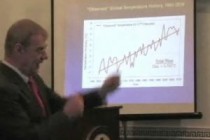by William Yeatman, Global Warming.org
On April 16th, the Cooler Heads Coalition and the Heritage Foundation hosted a briefing on Climategate by Dr. Patrick J. Michaels, Senior Fellow in Environmental Studies, Cato Institute and Joseph DAleo, Executive Director, ICECAP, and Consulting Meteorologist.

Dr. Patrick J. Michaels, Senior Fellow, CATO Institute
The scientific case for catastrophic global warming was already showing signs of weakening when the Climategate scientific fraud scandal broke in November 2009. This release of thousands of computer files and emails between leading global warming scientists showed evidence of data manipulation, flouting of freedom of information laws, and attempts to suppress publication of research that disagreed with the alarmist “consensus.”
Climategate has raised many questions about the reliability of key temperature records as well as the objectivity of the researchers and institutions involved, but it is far from the only global warming-related controversy. It has been followed by revelations that some of the most attention-grabbing claims in the 2007 UN Intergovernmental Panel on Climate Change’s (IPCC) Fourth Assessment Report - the supposed gold standard of climate science - were simply made up. Before laws regulating energy use are enacted that could well cost trillions of dollars, it is crucial to understand the extent to which the alleged scientific consensus supporting global warming alarmism has been discredited by these scandals. Join us for a discussion featuring two scientists who have closely studied Climategate.
Click here to view video of the briefing. See my PPT pdf here.
See post and more here.
Listen to this hour interview on Mark Gillar’s blog talk radio where I was one of the weekly guests. Look at the powerhouse line-up of other interviewees here.
------------------
EPA Staffers Were Forced to Ignore Science, Investigation Finds
By Sheila Kaplan
Environmental Protection Agency staffers have been forced to ignore relevant science, have lacked key monitoring data on human health and environmental impacts, and have worked without crucial information needed to protect the public, according to the preliminary findings of a scientific advisory board.
The Committee on Science Integration for Decision Making is still working on its investigation, but has quietly posted draft summaries on the agency’s website of 73 interviews with 450 EPA employees—an unusual bottom-up examination that could bring sweeping changes to the 40-year-old federal agency. Some staffers traced the problems in the agency to the Bush administration, while others said the obstacles are longstanding and continue to this day.
EPA has an enormous mandate—protecting air, water, land and human health from environmental pollutants. While some staffers gave the agency high marks, the interviews overall portray an organization that has been hobbled by political pressure to avoid damaging industry; has lacked sufficient scientists in regional offices; has been slow to act against known hazards, and has had a tendency to let products with harmful pollutants enter the marketplace and the environment without first ensuring their safety.
As part of its mission, the committee—informally called the Science Advisory Board—interviewed scores of EPA staffers from around the country between October 2009 and February 2010. To encourage open discussion, managers were generally interviewed separately from the rest of the staff. Many of the panel’s interviews were conducted in groups. Although the committee listed the names of everyone in each group, in most cases they did not reveal who said what.
Some participants noted “the chilling effect of management decisions made with the expectation that science would be ‘ginned up’ to support decisions already made,” according to a committee summary. One high-level EPA official charged that “the science review is used to create long-term loops that keep us from getting the latest information implemented in the field.” Another staffer said decisions on how to regulate air pollutants were “influenced more by politics than by science.”
One scientist who was interviewed believes the agency has been too eager to endorse new technologies or new uses of chemicals. As an example, she cited the EPA’s support of tire crumb, shredded tires used to line playgrounds to keep kids from being injured if they fall. Tire crumb can contain arsenic, cadmium, and other metals and toxic substances. Although EPA in December said the material was safe, this scientist told investigators, “Tire crumb, for example, should have been evaluated more fully before EPA supported its use for children’s playgrounds and ball fields...The result is a costly effort “post hoc” to assess children’s exposures to tire crumb waste, a problem that could have been prevented.” Read much more here.




